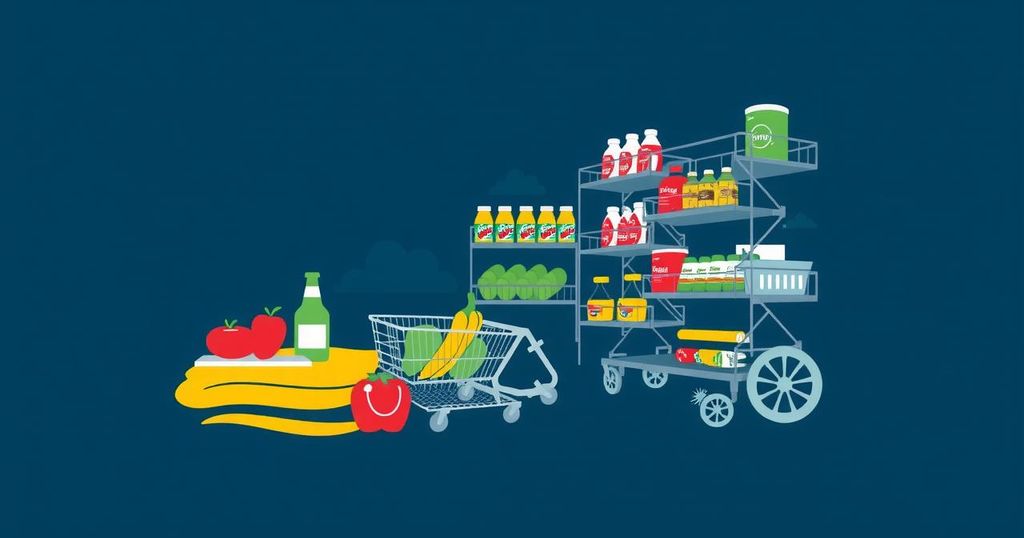Rising Grocery Prices and Political Consequences: A Global Perspective

Soaring prices of essentials significantly impacted U.S. elections, aiding Trump’s victory, as 75% of Republican voters reported financial hardships. This trend mirrors global sentiments, with India and Japan experiencing voter backlash against governments mishandling inflation caused by climate change and supply chain disruptions. Immediate reforms are essential for rebuilding resilient economic systems to address this crisis effectively.
In the recent US elections, soaring prices of essentials such as food and energy significantly influenced voter sentiments, contributing to Donald Trump’s electoral victory. Approximately 75% of Republican voters reported experiencing significant financial hardship due to rising costs, in stark contrast to only 25% of Democrats. This trend of price surges is observable in other major economies, including India and Japan, where voters expressed discontent with their governments’ handling of inflation driven largely by climate change and geopolitical tensions. The political ramifications of rising prices are not confined to the United States. In India, Prime Minister Narendra Modi’s ruling party faced setbacks, as food price inflation reached 8% amidst consumers’ perceptions of the government’s ineffective inflation management. Similarly, in Japan, the conservative coalition lost its majority, heavily impacted by unprecedented increases in food prices caused by a combination of climate factors and a depreciating currency. The phenomenon is global in scope, with significant price increases observed in basic food items across various continents due to climate-related harvest failures. Amidst escalating essentials prices, globally, staples such as olive oil and butter have seen price hikes of 90% and 80% respectively over the past two years. The consequences of climate change are compounded by unsustainable economic practices wherein few corporations have reaped record profits while the populace endures financial strain from inflated costs of living. Traditional economic models fail to capture the lived realities of consumers whose experiences diverge significantly from abstract measures like GDP. Economists must re-evaluate how inflation is measured and addressed, recognizing that superficial indicators do not reflect the economic distress experienced disproportionately by lower-income households. Instead of relying on conventional monetary policies that raise interest rates, which do little to alleviate supply shocks, governments should consider practical measures such as price controls on essential goods and investment in local production systems. This would not only stabilize prices but also fortify communities against future climate shocks and economic insecurities. In summary, immediate actions include implementing wealth taxes on profiting agribusinesses, exploring targeted price controls, and restructuring supply chains to enhance resilience. The urgency of addressing the intertwined challenges of climate change and economic equity has never been clearer as political landscapes continue to shift under the weight of escalating prices.
The article discusses the political consequences of rising grocery prices in the United States and globally, particularly in light of recent elections. It highlights how price surges in essential goods such as food and energy have deepened voter discontent with incumbent governments across major economies, attributing part of this to the impacts of climate change on agricultural productivity. The author stresses the inadequacy of current economic models in addressing the real experiences of citizens amid inflation, suggesting that they often fail to capture the disproportionate effects felt by lower-income households. Furthermore, the article proposes actionable policy reforms to mitigate these impacts, emphasizing the need for a paradigm shift in how economies respond to inflation caused by supply shocks.
In conclusion, the interconnected crises of price inflation and climate change require urgent and decisive policy measures. Rising grocery costs have profound political implications, undermining public confidence in incumbent governments and highlighting significant disparities in economic experiences among different socio-economic groups. It is imperative that governments adopt strategies that not only address immediate price concerns but also build resilient economic systems for the future, ultimately ensuring that essential goods remain accessible and affordable for all.
Original Source: www.theguardian.com








